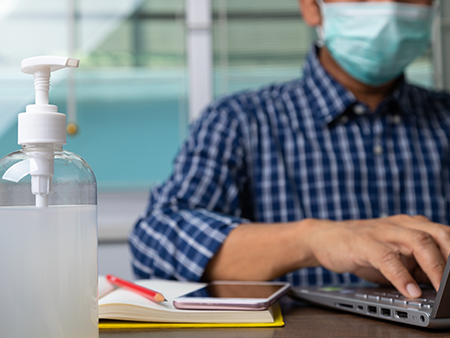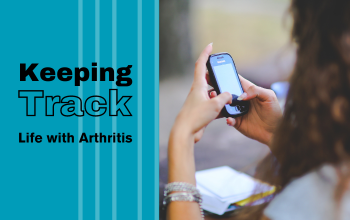Adjusting to the ‘New Normal’: Returning to School or Work during the Pandemic
Headed Back to School or Work This Fall? It’s Important to be Prepared and Stay Safe
 As fall approaches and provinces start to shift into different phases, a number of barriers will challenge students and employees as they go back to school and work. While we all need to continue to be vigilant and stay safe, if you are a person that suffers from an auto-immune disease, the ‘new normal’ requires extra care and attention to avoid the risks of COVID-19.
As fall approaches and provinces start to shift into different phases, a number of barriers will challenge students and employees as they go back to school and work. While we all need to continue to be vigilant and stay safe, if you are a person that suffers from an auto-immune disease, the ‘new normal’ requires extra care and attention to avoid the risks of COVID-19.
We recently checked in with people with arthritis who are immunocompromised to learn how they’ve been navigating through the pandemic and preparing themselves for the return to everyday life.
How has COVID-19 affected your work and how have you adjusted to returning to the workplace?
“I haven’t been off – both my family physician and rheumatologist agreed I was fine to work through the pandemic. I am an Operating Room Nurse, and in some ways, I feel safer at work than going to the grocery store. We have personal protection equipment, safety protocols to follow and a COVID-19 checklist that we go through every 24 hours.”— Heather (41), British Columbia, living with rheumatoid arthritis.
“My employer has been amazing. Many of my co-workers, myself included, are able to work from home and I’m really thankful for that. We’ve adjusted and adapted to working remotely. Zoom has helped keep us connected amid COVID-19.” — Melodie (43), Alberta, living with rheumatoid and psoriatic arthritis.
Ontario resident, Vanessa (35) who has rheumatoid arthritis and lupus, expressed that as a licenced home daycare provider, she already has rules that she must follow in regards to cleaning and reporting. For good measure, she’s also put extra safety protocols in place to increase protection for everyone.
“As an individual with a compromised immune system, I must implement additional precautions and routine practices. For instance, I take all children’s temperatures (my own children as well as myself) every morning and log them. All parents (myself included) must wear a mask at drop-off and pick-up. I’ve removed all stuffed animals and there are no blankets or throws unless it’s for naps. I’ve condensed the toys so only a small number are accessible and we are no longer allowed to play at parks, splash pads, libraries, or playgroups.”
How have you prepared yourself or your family to go back to school in the midst of the pandemic?
“I’m going to school to finish my Continuing Care Assistant (CCA) certificate and I’m also on the waitlist for the Licenced Practical Nurse (LPN) program. For school, many of my classes are online with extra assignments instead of exams to help limit contact.” — Sabrina (27), Saskatchewan, living with Juvenile Idiopathic Arthritis (JIA).
On the other hand, for parents such as Melodie and Vanessa, they have a tough choice to make and are wary about sending their kids back to school.
Melodie plans to homeschool her kids this fall. She understands that it will not be an easy task to maintain the balance of work, life and homeschooling, but the support of her friends and family does help.
Vanessa adds, “I’m very concerned about my two older children returning to school. I will have one going into the second grade and there is no practical safety plan in place yet at the elementary school. Although both are registered for the upcoming school year, I may keep them home come September.”
Others such as Laurie, a mother of one who lives with rheumatoid arthritis, is thinking about picking a small bubble consisting of other parents and taking turns in educating the kids.
With social distancing and isolation becoming the norm, how has COVID-19 affected your mental health or personal life?
Vanessa feels at a loss for what to do next and wonders when things will get back to ‘the norm.’ “I miss regular interactions with neighbours, friends, and family. This has definitely affected my family’s mental health as well as my own. My children miss their friends and social interaction.”
“I have only been to two stores since March and I am very cautious each time. I sanitize items before I touch them and avoid stores without a mask mandate. I have had a lot of support from my family; they help pick up things from the stores, they visit and help watch the kids in the backyard so I can have a break and not feel so isolated. I have not allowed anyone in my home since March. —Jenean (35), Ontario, living with rheumatoid arthritis.
“I own an electrical wholesale company and I’m a father of two. I certainly noticed my stress level going up with the uncertainty of COVID-19 and how it would affect my business and my children’s education. Being immunosuppressed also created concerns because I’m at a higher risk of getting COVID-19. When I finally saw how high my stress level had gotten, I took action to actively change my perspective on everything. Instead of stressing about my business, I was grateful that we were able to remain open and took the opportunity to expand into some new markets that had opened because of COVID-19. Instead of viewing homeschooling my kids as an inconvenience, I began to view it as an opportunity to spend more time with them, and to understand what they’re working on in school and how they learn. I give myself breaks and try to squeeze in extra outdoor time with the kids! — Scott (45), Alberta, living with rheumatoid arthritis.
How can others help those with an autoimmune disease feel comfortable and safe?
Heather from British Columbia says, “Social distance! I share that I am immunocompromised so people are aware. I am more at risk even though I may not look like it as I am young.”
Most importantly, if you are working or returning to school this fall, please remember to stay home if you’re sick, wash your hands, wear a mask, and practice social distancing – we’re all in this together. To learn more about employment and COVID-19 and what people with arthritis need to know, please check out Arthritis Research Canada’s COVID-19 updates. Be kind, be calm and be safe!


























































